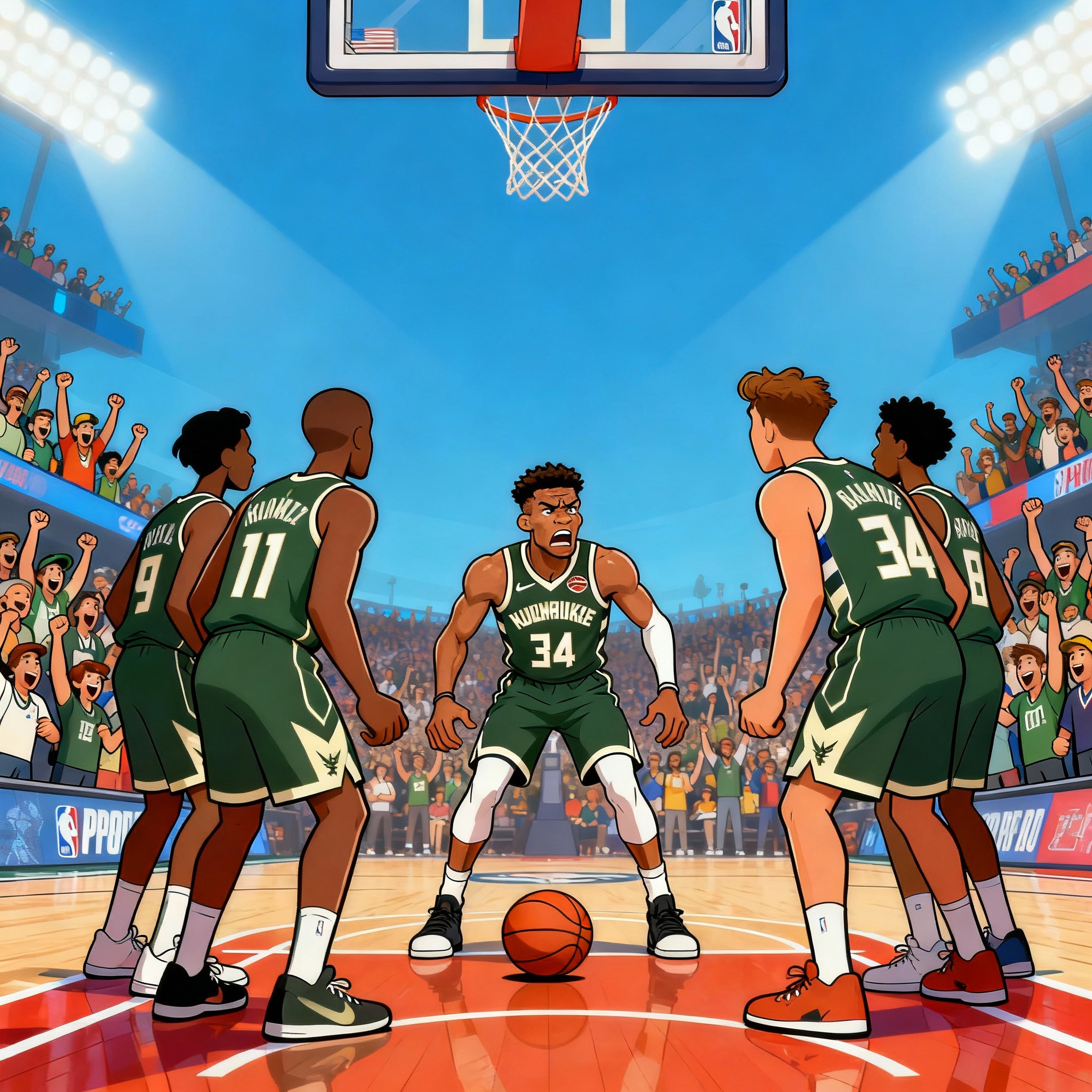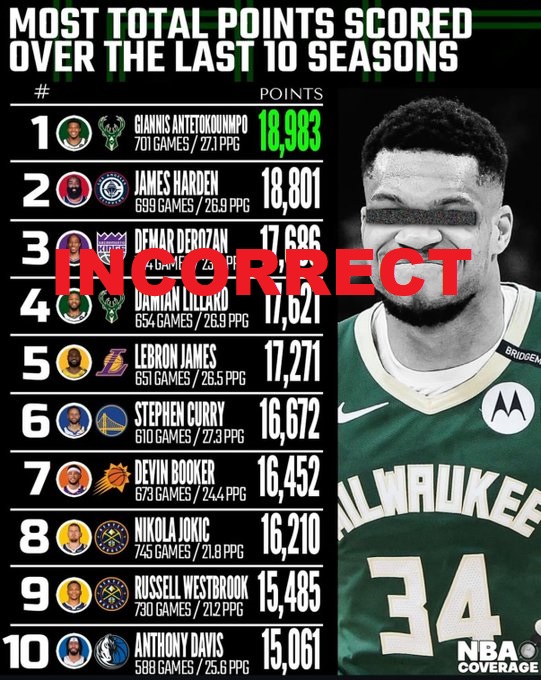While Giannis Antetokounmpo has indeed struggled with consistent playoff success, with six first-round exits in his ten playoff appearances (60% first-round exit rate) , a few more top 100 NBA players of all time have actually had worse or comparable playoff failures relative to their talent and expectations.
Karl Malone – Often ranked in the top 15-20 all-time
Karl Malone holds the unfortunate record for most playoff games (193) without winning a championship. Despite being a two-time MVP and reaching two Finals, he suffered multiple devastating losses:
- Lost both Finals appearances to Michael Jordan’s Bulls (1997, 1998)
- Had significant playoff efficiency drops compared to regular season performance
- His transition-heavy style was less effective against disciplined playoff defenses
Charles Barkley – Universally considered top 20-25 all-time
Barkley had a worse playoff series record than Giannis, going 12-13 in playoff series throughout his career :
- Only one Finals appearance (1993 loss to Bulls)
- Eight first-round exits, compared to Giannis’s six
- Career playoff record of 62-61, barely above .500
Steve Nash – Two-time MVP, often ranked 30-40 all-time
Nash never reached an NBA Finals despite his elite regular season success :cbc+1
- Played 120 career playoff games without a championship
- Series record of 11-12 in the playoffs
- Multiple devastating playoff exits with Phoenix despite having superior teamsyoutubecbc
Reggie Miller – Hall of Famer, top 50-75 all-time
Miller’s playoff record was remarkably similar to current Giannis :
- Series record of 14-15 in 29 playoff series
- Eight first-round exits throughout career
- Only one Finals appearance (2000 loss to Lakers)
- Played 144 playoff games without winning a championship
Patrick Ewing – Top 50 player, #1 draft pick with championship expectations
Despite being the centerpiece of multiple strong Knicks teams, Ewing never won a championship :
- Went 0-5 against Michael Jordan’s Bulls in playoff matchups
- 139 career playoff games without a title
- Known for several crucial playoff failures, including the infamous missed finger-roll
Players with Similar or Slightly Better Records
Chris Paul – Top 75 player, “Point God”
Paul has had numerous devastating playoff collapses :
- Record holder for most blown 2-0 playoff leads (4)
- Series record barely above .500 at 72-68 overall
- Only advanced past the second round twice in 13 playoff appearances
- Eight first-round exits in his career
James Harden – Former MVP, top 75 player
Despite regular season excellence, Harden has underperformed in crucial playoff moments :
- Multiple playoff collapses, including the infamous 2018 Western Conference Finals
- Known for poor elimination game performances
- Only one Finals appearance (2012 with OKC as sixth man)
Recent Struggles in Context
Giannis’s recent struggles three consecutive first-round exits from 2023-2025 are concerning. But while Giannis’s six first-round exits in ten appearances represent genuine playoff struggles, at least 5-7 other top 100 players had worse or comparable playoff failures relative to their talent and expectations. Players like Karl Malone, Charles Barkley, Steve Nash, Reggie Miller, and Patrick Ewing all had more devastating playoff careers when accounting for their lack of championships and multiple crushing defeats.
Why Giannis Struggles in the Playoffs: A Comprehensive Analysis
Giannis Antetokounmpo isn’t inherently “bad” in the playoffs—he still puts up impressive individual numbers—but he faces specific, exploitable weaknesses that championship-level teams have learned to target systematically. His playoff struggles stem from a combination of technical limitations, strategic vulnerabilities, and psychological factors that become magnified under postseason pressure.
The Primary Weaknesses
Free Throw Shooting: The Fatal Flaw
Giannis’s most glaring weakness is his free throw shooting, which deteriorates significantly in the playoffs :
- Career playoff free throw percentage: 62% compared to 69.3% in regular season
- Recent playoff performance: As low as 57% in some series
- Strategic impact: Teams deliberately foul him late in games, knowing he’s likely to miss
His excessively long free throw routine (15-20 seconds per shot) creates mental pressure and allows fans to affect his concentration. The routine lacks fluidity and doesn’t mirror his actual shooting motion, making it essentially “not a basketball act”.
The “Giannis Wall” Strategy
Since 2019, teams have deployed a devastating defensive scheme called “The Wall” that has consistently neutralized his dominance :
How it works:
- Three defenders collapse on Giannis when he drives, forming a “wall”
- Two additional defenders stay back to contest his kick-out passes
- Forces him into difficult shots or turnovers
Historical success against Giannis:
- 2019 Raptors: Pioneered the strategy, won series 4-2
- 2020 Heat: Perfected it, dominated series 4-1
- 2022 Celtics: Used effectively despite losing 4-3
- 2023-2025: Multiple teams continue using variations successfully
Three-Point Shooting Vulnerability
Teams actively encourage Giannis to shoot three-pointers, knowing it plays away from his strengths :
- Recent playoff 3PT%: 25-27%, well below league average
- Strategic exploitation: Defenses sag off him, daring him to shoot
- Shot selection issues: Takes contested threes instead of driving when teams expect it
Psychological and Tactical Factors
Pressure and Decision-Making
Giannis struggles with decision-making when facing intense playoff pressure :
- Turnover increase: Higher turnover rate in playoffs, especially against walls
- Forcing shots: Tends to force drives into set defenses rather than making correct passes
- Takes it personally: Admits he gets emotional when facing “The Wall” strategy
Supporting Cast Dependency
Unlike other superstars, Giannis requires exceptional supporting cast performance to succeed :
- 2021 championship context: Won with injured opponents (Nets’ Big 3, Lakers’ stars)
- Recent struggles: When Middleton, Holiday, or Lillard struggle, Bucks lose
- Role player reliance: Needs shooters to make open shots when he passes out of walls
Screen Setting Deficiency
An underrated weakness that affects team offense :
- Poor technique: Sets “ghost screens” that don’t create real advantages
- Low efficiency: Only 30th percentile as pick-and-roll roll man
- Impact on teammates: Limits Damian Lillard’s effectiveness in pick-and-roll
Why These Weaknesses Are Magnified in Playoffs
Preparation Time
Playoff teams have extensive time to study and prepare specific schemes :
- Regular season success doesn’t translate when teams gameplan specifically for him
- Coaches like Nick Nurse, Erik Spoelstra excel at exploiting these weaknesses systematically
Defensive Intensity and Focus
Playoff defenses are more disciplined and committed to executing complex schemes :
- Teams willing to sacrifice individual defense to build effective walls
- Better communication and rotation on defensive schemes
- More physical play that disrupts his rhythm
Clutch Moments and Mental Pressure
High-stakes situations expose his technical limitations :
- Free throw struggles become magnified in close games
- Three-point shooting weakness limits late-game options
- Increased pressure affects decision-making under duress
The Championship Exception: 2021
Giannis’s 2021 championship run succeeded because of unique circumstances :
- Opponent injuries: Brooklyn’s Big 3 were injured, Lakers eliminated early
- Supporting cast peak: Middleton and Holiday played at their highest level
- Health: Giannis overcame his own knee injury to deliver historic Finals performance
Giannis isn’t “bad” in the playoffs—he’s a victim of solvable basketball problems that he hasn’t adequately addressed. His combination of free throw struggles, three-point shooting deficiencies, and vulnerability to sophisticated defensive schemes creates a blueprint that disciplined playoff teams can exploit. Unlike transcendent playoff performers who elevate their games under pressure, Giannis’s technical limitations become more pronounced when facing elite, prepared defenses with months to gameplan specifically for his weaknesses.




